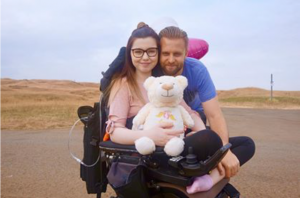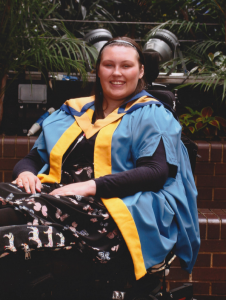Talking about… sex and relationships: Young people speak out
How do young people facing life-limiting or life-threatening conditions handle relationships and talk about sex?
Making friends, exploring sex and developing relationships are an important part of becoming an adult. But young people with life-limiting or life-threatening conditions have limited opportunities to learn about relationships and sex. Family, carers and health practitioners can feel ill-prepared to discuss sex with young people.
Background information
The sex and relationships project for people with life-limiting conditions is a multi-agency, multi-professional inclusive study exploring sex, intimacy and relationships for young people and adults with life-limiting and/or life-shortening conditions.
Until the 1990s, children and young people with life-limiting conditions were unlikely to survive into adulthood. These children often died soon after birth, in early childhood, or their early teens, because of the seriousness of their conditions; only exceptionally did they survive into adulthood. Due to advancements in medical science and technology, improved neonatal care (albeit with significant morbidity), and overall improved health, clinical and social care services, increasing numbers of children with life-limiting conditions are surviving into adulthood, indeed many into their third or fourth decade.
Talking about sex and relationships can be difficult in so far as it is often considered to be something that is personal, private and even taboo. For adults with life-limiting conditions talking about this subject can be even more difficult because most individuals were not expected to live into adulthood and are now doing so but their life trajectory and expectancy is uncertain and likely to be limited. Many adults with life-limiting conditions will be living with physical and/or cognitive impairments as a result of their condition, as well as experiencing bouts of acute and chronic illness and periods of treatment. Many individuals will be living or will have lived in residential settings and will have spent considerable time in hospitals or in hospices. On reaching adulthood, many individuals are also likely to be living with family, be reliant on carers and are less likely to be living independently in comparison to people of similar age.
Very little is known about the needs and expectations of this new group and given its demographic infancy, very little empirical work has been carried out with this population. The objective of this study was to explore the views of people with life-limiting conditions focusing specifically on the issues of sex and relationships.
The first phase of this project, which was funded by the Higher Education Innovation Fund, focused on the development of guidance and standards on sex and relationships for those working with or supporting people with life-limiting conditions. A copy of the guidance and standards is free to download here.
You can find out more about this study by visiting the Sexuality Alliance website, by checking out the blog written by some of the young adults involved in the project, or by reading this article in The Conversation.
Led by The Open University – Talking about…sex and relationships: Young people speak out – will help these young people navigate this sensitive subject. With Hospice UK, the project will develop educational resources to help young people have conversations about sex, intimacy and relationships with their family, carers or professional support staff. Health practitioners will better support them on this invisible topic through knowledge, resources and a better understanding of the views and experiences of young people themselves. It has been awarded £40,000 by the Improving Transitions for Young People Fund, run by the charity Together for Short Lives.
Sometimes sex can be difficult to talk about, especially if you are a young person with a life-limiting or life-threatening condition. Over the next two years this project will support young people to talk about sex, relationships and intimacy, ensuring that their needs are met, and that they have every opportunity to live a rich and fulfilling life filled with friendship and fun.
Dr Sarah Earle
Director of the Open University’s Priority Research Area in Health & Wellbeing
The three videos here have been produced as part of the project and aim to break barriers, challenge assumptions, overcome negative perceptions and try to correct prejudiced attitudes by putting sexuality on the radar for young people with life-limiting or life-threatening conditions (LLTCs). The videos share some experiences of young people with LLTCs who are trying to live their lives to the fullest. The films address relationships, sex, intimacy, privacy, reproductive choices and loss and the challenges young people face. We hope that the three videos will be used by health and social care professionals and others to improve recognition and understanding for young people as to how sexuality, sex, relationships and intimacy are crucial to physical, social and emotional well-being.
Navigating sexuality and relationships
 Chloe is 23 and lives with her partner Jordan in Stratford-Upon-Avon, UK. She feels there is a gap in education and awareness of the needs of young people with life-limiting conditions.
Chloe is 23 and lives with her partner Jordan in Stratford-Upon-Avon, UK. She feels there is a gap in education and awareness of the needs of young people with life-limiting conditions.
“I live with a number of conditions contributing to a life limiting condition and disabilities. This has been something I have dealt with since a young teenager, an age where puberty hits and young people usually grow into relationships and their sexual identity. As a young person with a disability this was something very different for me to navigate and with very limited support and resources it was something I feel I have navigated alone. I am now blessed with an incredible partner Jordan, who I have been with for 3 years. We have also been trying to start to grow a family which sadly resulted in the loss of our daughter at 22 weeks and 3 miscarriages.”
“As a disabled person with life limiting illness planning to start a family I have faced difficulties in lack of understanding and ethical uncertainties that i feel the work of the OU-SA could have helped clarify massively. I strongly believe that the needs of young people in regards to sexuality and relationships when dealing with life limiting conditions and disability could be supported in a much better way.”
Support for this aspect of life
 Lucy Watts MBE, who recently became an OU Honorary Graduate, is part of the OU Sexuality Alliance and is a disability advocate. She said:
Lucy Watts MBE, who recently became an OU Honorary Graduate, is part of the OU Sexuality Alliance and is a disability advocate. She said:
“We all have differing experiences of sexuality, sex and relationships and have come together as we passionately believe that it is a normal part of growing up and we want to make sure we, as young people, and the professionals and individuals around us, have the tools and resources we need to explore and be supported with this aspect of our lives.”
Project outcomes
As part of the Talking about. Sex and Relationships project, young people have led on the production of a range of resources that are freely available on the global platform OpenLearn.
- Try our interactive video to explore the challenges of talking about sex if you are disabled and living with a life-limiting condition.
- Download our booklet which supports young people and carers to talk about sex in a relaxed and supportive way.
- Watch our video ‘Intimate not Intimidated’, nominated for the Best Educational Film by the Learning on Screen Awards; six young people talk about sex, intimacy and relationships when you have a life-limiting or life-threatening condition.
- Read our other resources including some ‘top tips’ on talking about sex and relationships and ‘five things you should know’about being LGBTQ and disabled.
- Led by the Young People’s group AdversiTeam, this project has been an amazing experience for them. You can hear directly about why this project has been so meaningful by watching this video here.
Sexuality Alliance and Project Partners
- Carrie Aimes, Adversi Team
- Sharon Ballingall, Children’s Hospice Association Scotland
- Celine Barry, Action Duchenne
- Maddie Blackburn (Chair of the Sexuality Alliance) The Open University
- Leah Booth, Adversi Team
- Colin Bowker, Care Quality Commission (CQC)
- Lucy Brumpton, EACH
- Lizzie Chambers, Together for Short Lives
- Mark Chapman, DMD Pathfinders
- Alison Cooke, Rainbows Hospice
- Chelsea Corbett, Adversi Team
- Claire du Than, SHADA
- Sarah Earle (Principal Investigator) The Open University
- Amy Frouks, Adversi Team
- Hameed Jimoh (Junior), Adversi Team
- Simon Hardcastle, East Midlands Clinical Network
- Jon Hasti, DMD Pathfinders
- Sharon Harvey, Demelza Hospice
- Laura Klepping, Helen & Douglas House Hospice
- Susie Lapwood, Helen & Douglas House Hospice
- Kirsty Liddiard, University of Sheffield
- Ravi Mehta, Adversi Team
- Sam Mildon, Adversi Team
- Manjula Patel, Murray Hall
- Chloe Print Lambert, Adversi Team
- David Raeburn, Public Legal Education & Pro Bono Specialist
- Molly Smith, Adversi Team
- Phillipa Sellar, St Christopher’s Hospice
- Anjali Solanki, Adversi Team
- Rebecca (Becca) Torricelli, Adversi Team
- Carole Walford, Hospice UK
- Lucy Watt MBE, Master of The Open University, Adversi Team
- Katherine Watt, Carer/Parent Expertise
- Lauren West, Muscular Dystrohpy UK
- Richard Whateley, The Myraid Centre